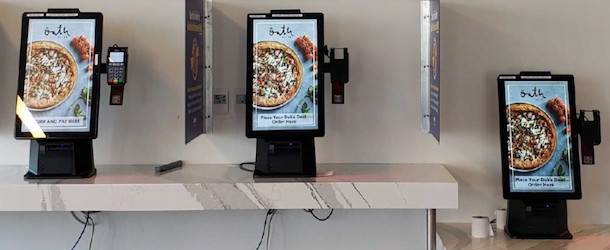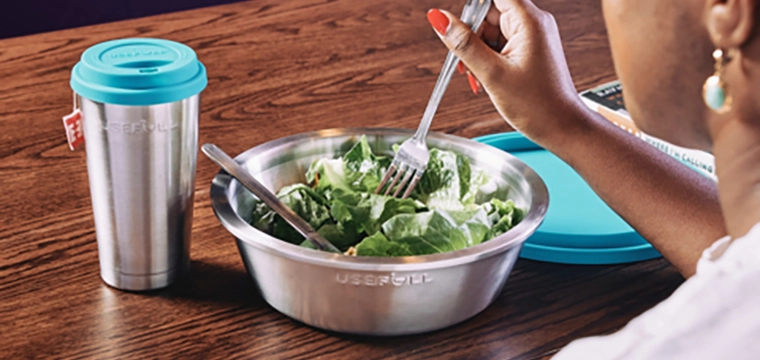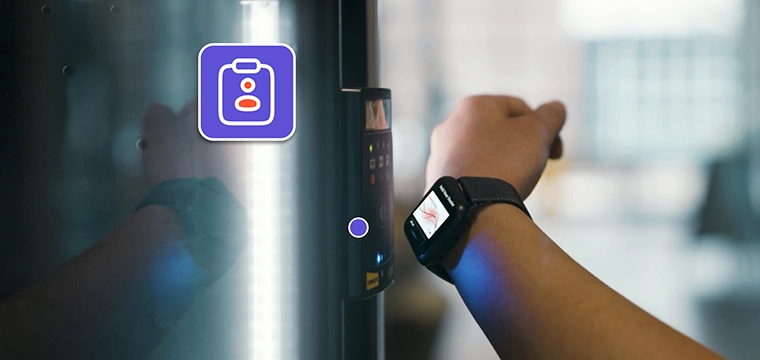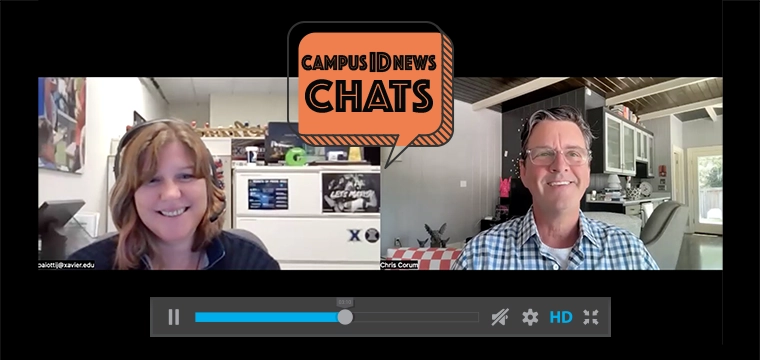
Boston College has joined a growing roster of universities to turn to technology in campus dining to both streamline efficiencies in dining operations, and also account for the growing labor shortage challenge in higher ed. To accomplish this, Boston College is working with transaction system provider, CBORD, to leverage Nextep self-service kiosks and mobile ordering through the GET app to alleviate queuing at a new campus dining location.
BC has deployed two new self-service dining kiosks at the campus’ brand new Integrated Science Building. The center is a state-of-the-art building featuring The Schiller Institute for Integrated Science and Society, and new dining concept called the Tully Family Café and Commons.
The dining location is a small café that includes a range of coffee offerings along with the ability to prepare limited food options. With a smaller footprint and limited infrastructure, the new dining location inspired BC to look at new ways to boost throughput, while also requiring fewer people to staff the operation.
“As the building was under construction, the idea of kiosks was raised because the counter space was clearly going to be very limited,” says John Connelly, Retail Systems Administrator at Boston College. “There was barely enough space for standard pick up.”
“We also started to look at cashless concepts. And as we explored the cashless idea, we began to question whether we would even need a cashier at all,” adds Connelly. “Our dining services looked at dining robots, pizza making robots, and the like, but we determined that kiosk ordering was the best solution on offer.”
The final solution for BC is a combination of Nextep Kiosks for walk-up ordering, and pick-up lockers for mobile order fulfillment through the CBORD GET app. Student orders placed through the GET app at the Tully café are sent to the pickup lockers, while kiosk orders are sent straight to the counter.
“With the new science center featuring robotics labs and a data visualization space, we thought it would be a great opportunity to implement dining technology for ordering, and revamp traditional ordering at a POS terminal.”
Students can place the same order on GET as they can at the kiosk, but the two are separate systems. The pickup locker system for mobile orders had already been utilized on campus previously, so campus dining knew more or less what to expect from that workflow.
The pickup locker solution is provided by Carter-Hoffman. After placing an order through GET, the student is sent a QR code that they can scan when they arrive at the lockers.
“The locker system will also send additional notifications if the student hasn’t picked up their food after the first five minutes, followed by a notification to staff after 15 minutes at which point the staff can make the decision to expire that order,” says Connelly. “In general, very few orders get expired.”
BC has made the Tully café location a completely cashless environment, with the student ID card playing a central role.
“The Nextep kiosks take the student ID card or any major credit/debit card,” says Connelly. “We knew we wanted to support the student ID card for payment, because if you don’t, then it’s pretty useless to most students.”
“At Tully Science Center, all orders are coming in through either the GET mobile app to the lockers, or via self-service kiosks,” adds Connelly. “There is no POS, there is no cashier, there is no cash.”
Another unexpected caveat to the kiosk deployment, in part brought on by the pandemic, was that the decision to purchase and deploy was made in a vacuum.
“Unfortunately, CBORD didn’t have its User Group Conference with COVID going on, so we didn’t even really get to play around with the kiosks before deploying,” says Connelly. “But there’s trust and faith in the partnership, and we also reserve the right to box it up and ship it back if it doesn’t do what we want it to.”
Connelly explains that any technology he or his team deploy will be tested to its limits.
“In our department we tend to buy solutions that do what we want, and then we say ‘now make it do this, this, and this,’” says Connelly. “We ask a lot of the technology that we implement, and I have to say the Nextep kiosks were pretty good right out of the box.”
Install and set up was also seamless.
“Nextep did a fantastic job of taking our menus and artwork and integrating them on the backend to make them look good on the kiosk screens,” says Connelly. “They’ve been a value-added partner for sure. They didn’t just hand it off to us and walk away, they built it all for us.”
CBORD and Nextep partnered to provide the kiosks, with the latter shouldering the up-front installation. “Techs from both companies were on campus for three days to install, set up and test the kiosks and kitchen printers,” says Connelly.
Once Nextep completed the installation and backend work to get BC up and running, ongoing support has since shifted over to CBORD, says Connelly.
Reiterating the modest stature of the dining location, Connelly lauds the café’s success thus far.
“The downside has been very small. We’re seeing over 400 daily orders,” says Connelly. “If you had a food truck, that’s basically the footprint that we’re working with in this kitchen and dining location. The café is hopping.”
Connelly says the checkout time is about a minute and six seconds per person to place an order; from them first touching the kiosk screen to printing their receipt.
“The lines are now at the kiosks, but even that has tapered down as the initial novelty wore off,” says Connelly. “It’s actually better than interacting with a cashier, particularly when cash is involved.”
While BC is using kiosks in one location currently, expansion is already on the horizon.
“The bigger picture is that COVID, coupled with a lack of people interested in doing cashier and food-service work, has made us look at the kiosk concept as a way to alleviate missing manpower,” says Connelly. “In addition to little counter space, the Tully café space also carried a limited staffing budget.”
Staffing shortages have been a recurring challenge across higher ed in recent months, with dining one of the departments impacted the most. As of yet, there’s little sign of relief.
“We have as many as fourteen temp workers working in a single building, and that’s part of why we looked to kiosks,” he adds. “We’re devoting a lot of budget to temp workers.”
BC has already requested quotes on new kiosks for two additional, preexisting on-campus locations. The additional locations are similar to the science center in that they’re fast casual: walk up, order your food and then sit down or takeaway.
“We’re still dealing with a manpower shortage,” says Connelly. “We’re not looking to replace people with technology, but if we can either alleviate hiring temp workers or use kiosks to shift existing employees from cashiering to food prep or stocking, then it’s a positive."




